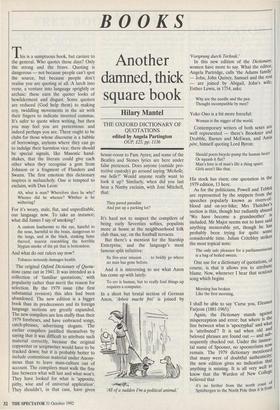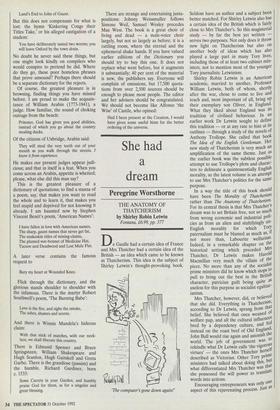BOOKS
Another damned, thick square book
Hilary Mantel
THE OXFORD DICTIONARY OF QUOTATIONS edited by Angela Partington OUP, £25, pp. 1136 This is a sumptuous book, but caviare to the general. Who quotes these days? Only the strong and the brave. Quoting is dangerous — not because people can't spot the source, but because people don't realise you are quoting at all. A :lurch into verse, a venture into language sprightly or archaic: these earn the quoter looks of bewilderment and disgust. Some quoters are reduced (God help them) to making coy, twiddling movements in the air with their fingers to indicate inverted commas. It's safer to quote when writing, but then you may feel you are pretentious: and indeed perhaps you are. There ought to be clubs for those whose discourse is a babble of borrowings, asylums where they can go to indulge their harmless vice; there should be special signals, like Masonic hand- shakes, that the literate could give each other when they recognise a gem from Johnson or a fragment of Flanders and Swann. The first emotion this dictionary inspires is melancholy. One is tempted to exclaim, with Dan Leon:
Ah, what is man? Wherefore does he why? Whence did he whence? Whither is he withering?
For it's weary, stale, flat, and unprofitable, our language now. To take an instance; what did James I say of smoking?
A custom loathsome to the eye, hateful to the nose, harmful to the brain, dangerous to the lungs, and in the black, stinking fume thereof, nearest resembling the horrible Stygian smoke of the pit that is bottomless.
And what do our rulers say now? Tobacco seriously damages health.
The original Oxford Dictionary of Quota- tions came out in 1941. It was intended as a collection of 'familiar quotations,' with popularity rather than merit the reason for selection. By the 1979 issue (the first substantial revision) this idea had been abandoned. The new edition is a bigger book than its predecessors and its foreign language sections are greatly expanded. The new compilers are less stuffy than their 1979 forebears, and have embraced songs, catch-phrases, advertising slogans. The earlier compilers justified themselves by saying that it was difficult to attribute such material correctly, because the original copywriter or scriptwriter would have to be tracked down; but it is probably better to include contentious material under Anony- mous than to leave mass-culture out of account. The compilers must walk the fine line between what will last and what won't. They have looked for what is 'apposite, pithy, wise and of universal application'. They shouldn't, in that case, have given house-room to Pam Ayres; and some of the Beatles and Stones lyrics are here under false pretences. Does anyone (outside pro- tective custody) go around saying 'Michelle, ma belle?' Would anyone really want to look it up? Similarly, when did you last hear a Nimby exclaim, with Joni Mitchell, that:
They paved paradise And put up a parking lot?
It's hard not to suspect the compilers of being early Seventies softies, populists more at home at the neighbourhood folk club than, say, on the football terraces.
But there's a mention for the Starship Enterprise, and the language's most famous split infinitive:
Its five-year mission . . . to boldly go where no man has gone before.
And it is interesting to see what Anon has come up with lately:
To err is human, but to really foul things up requires a computer.
In a short but brutal section of German Anon, 'Arbeit macht frei' is joined by
All of a sudden I'm a political animaL' `Vorsprung Burch Technik.'
In this new edition of the Dictionary, women have more to say. What the editor, Angela Partridge, calls 'the Adams family' — John, John Quincy, Samuel and the rest — are joined by Abigail, John's wife. Esther Lewis, in 1754, asks:
Why are the needle and the pen Thought incompatible by men?
Yoko Ono is a bit more forceful: Woman is the nigger of the world.
Contemporary writers of both sexes are well represented — there's Brookner and Drabble, Barnes and McEwan, and Amts pere, himself quoting Lord Byron:
Should poets bicycle-pump the human heart Or squash it flat?
Man's love is of man's life a thing apart; Girls aren't like that.
His stock has risen; one quotation in the 1979 edition, 13 here.
As for the politicians, Powell and Tebbit are represented by the snippets from the speeches popularly known as rivers-of- blood and on-yer-bike; Mrs Thatcher's section is thin, though her radiantly absurd `We have become a grandmother'
is included. Mr Major seems not to have said anything memorable yet, though he has probably been trying for quite some considerable time. Julian Critchley strikes the most topical note:
The only safe pleasure for a parliamentarian is a bag of boiled sweets.
One use for a dictionary of quotations, of course, is that it allows you to attribute blame. Now, whenever I hear that noxious song which begins
Morning has broken Like the first morning,
I shall be able to say 'Curse you, Eleanor Farjeon (1881-1965).'
Again, the Dictionary stands against misperception and error; but where is the line between what is 'apocryphal' and what is 'attributed'? It is sad when old and beloved phrases are found out — and sub- sequently chucked out. Under the immor- tal name of Spooner, no spoonerisms now remain. The 1979 dictionary mentioned that many were of doubtful authenticity; the new edition gives no indication that anything is missing. It is all very well to know that the Warden of New College believed that
it's no farther from the north coast of Spitzbergen to the North Pole than it is from Land's End to John of Gaunt.
But this does not compensate for what is lost: the hymn `Kinkering Congs their Titles Take,' or his alleged castigation of a student: You have deliberately tasted two worms; you will leave Oxford by the town drain.
No doubt he never said these things, but one might look kindly on compilers who would conspire to pretend he did. Where do they go, these poor homeless phrases that prove unsound? Perhaps there should be a separate dictionary for the rejects.
Of course, the greatest pleasure is in browsing, finding things you have missed before. I am proud to make the acquain- tance of William Arabin (1773-1841), a judge. How familiar, the sound of choking outrage from the bench: Prisoner, God has given you good abilities, instead of which you go about the country stealing ducks.
Of the citizens of Uxbridge, Arabin said:
They will steal the very teeth out of your mouth as you walk through the streets. I know it from experience.
He makes our present judges appear judi- cious; and that in itself is a feat. When you come across an Arabin, appetite is whetted; please, what else did this man say?
This is the greatest pleasure of a dictionary of quotations; to find a stanza of a poem, say,' that makes you want to read the whole and to learn it, that makes you feel stupid and deprived for not knowing it already. I am haunted now by Stephen Vincent Benet's poem, 'American Names':
I have fallen in love with American names, The sharp, gaunt names that never get fat, The snakeskin titles of mining-claims, The plumed war-bonnet of Medicine Hat, Tucson and Deadwood and Lost Mule Flat.
A later verse contains the famous request to Bury my heart at Wounded Knee.
Flick through the dictionary, and the glorious stands shoulder to shoulder with the infamous. There is the martyr Robert Southwell's poem, 'The Burning Babe': Love is the fire, and sighs the smoke, The ashes, shames and scorns.
And there is Winnie Mandela's hideous claim: With that stick of matches, with our neck- lace, we shall liberate this country.
There is Edmund Spenser and. Bruce Springsteen, William Shakespeare and Hugh Scanlon, Hugh Gaitskell and Greta Garbo. There is the grandiose (passim) and the humble. Richard Gardiner, born c. 1533: Sowe Carrets in your Garden, and humbly praise God for them, as for a singular and great blessing.
There are strange and entertaining juxta- positions: Johnny Weissmuller follows Simone Weil, Samuel • Wesley precedes Mae West. The book is a great choir of living and dead — a male-voice choir largely, but not so largely as before; it is a rattling room, where the eternal and the ephemeral shake hands. If you have valued earlier editions of the Dictionary you should try to buy this one. It does not replace what went before, but it augments it substantially; 40 per cent of the material is new, the publishers say. Everyone will complain of omissions, but 17,500 quota- tions from over 2,500 sources should be enough to please most people. The editor and her advisers should be congratulated. We should not become like Alfonso 'the Wise' of Castile, who opined:
Had I been present at the Creation, I would have given some useful hints for the better ordering of the universe.



























































 Previous page
Previous page